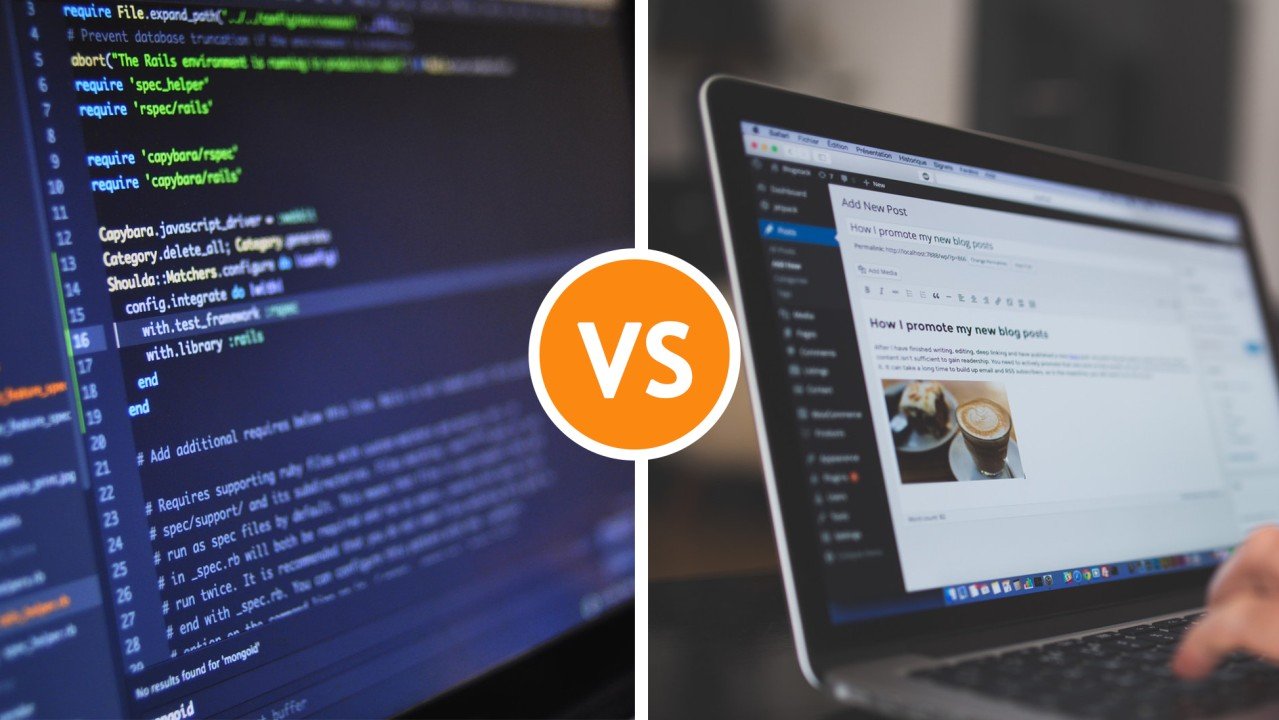WordPress vs. Coding From Scratch: Which Builds a Better Website?
Creating a website is thrilling, but deciding between using WordPress vs. coding from scratch can be overwhelming. This guide breaks down the pros, cons, and important factors to help you choose the best option for building your website. Let’s begin.
What are WordPress and Coding?
WordPress is a popular content management system (CMS) that allows users to create and manage websites easily. It is very user-friendly and provides a range of tools and features that make website creation and management accessible to users with little to no coding knowledge. You can learn more about it here.

According to Hubspot, Coding is the process of using programming languages to give instructions to a computer. These instructions power the websites, software, and applications people use every day.

WordPress vs. Coding From Scratch: A Quick Overview
| Feature | WordPress | Coding from Scratch |
|---|---|---|
| Ease of use | User-friendly, perfect for beginners | This may require hiring developers or relying on limited resources |
| Development speed | Rapid deployment, ideal for quick launches | Time-consuming, may have significant start-up delays |
| Customization | Huge selection of themes and plugins | Boundless customization, perfect for unique requirements |
| Maintenance | Streamlined updates, often automated | Manual updates, full responsibility for security and bug fixes |
| Scalability | Handles sites of all sizes, from blogs to enterprise-level | Built for scalability, excellent for high-traffic and data-driven projects |
| Support | Extensive community, tutorials, forums | May require hiring developers or relying on limited resources |
| Cost | Open-source, potential costs for premium tools | Development fees, ongoing maintenance expenses |
| Security | Robust but needs user vigilance, plugin vulnerabilities | More control over security, but increased risk if not diligent |
WordPress vs. Coding: Key factors to consider
- Skill Level: If you’re new to web development, WordPress is your fastest path. If you have HTML, CSS, JavaScript (and potentially backend languages) expertise, coding from scratch is viable.
- Project Needs: WordPress + plugins can often achieve even advanced features. A purely custom build is better for highly specialized web apps or unique user experiences.
- Time Investment: Coding from scratch takes the longest. WordPress is faster, but still factors in theme selection, customization, and ongoing updates.
- Budget: Open-source WordPress may hide costs: premium themes, plugins, and potential developer assistance. Coding from scratch involves development costs and potential ongoing maintenance.
- Security: WordPress security needs active maintenance. Custom-built sites are potentially more secure if you’re rigorous with security practices.
Real-World Examples
- Built with WordPress: Blogs like TechCrunch, news giants like Variety, and even companies like Sony Music utilize the power and flexibility of WordPress. See more examples of websites built with wordpress.
- Built with Custom Code: Facebook, Netflix, and Airbnb demonstrate the necessity of custom-built solutions for platforms processing massive amounts of data and user interactions.
The Hybrid Solution: WordPress + Custom Code
It’s important to note that WordPress doesn’t exclude coding. Many web developers use WordPress as a foundation, customizing it with code for advanced functionality or unique design features.
The Verdict
For most individuals and businesses, WordPress strikes an excellent balance between ease of use, customization potential, and affordability. However, if your project has highly specific requirements, needs unmatched speed, or possesses in-house development expertise, building from scratch could be the better solution.
WordPress vs. Coding: FAQ
What is the difference between learning to build websites with WordPress vs. coding?
WordPress is like a ready-made framework for building websites.
It’s divided into two parts: the back end, which is already set up using a language called PHP and talks to a database, and the front end, which is what users see and interact with.
If you just want to get a website up and running quickly, you can use pre-made themes and plugins. It’s like snapping together pieces of a puzzle. But if you want to customize things more, you’ll need to know some PHP to write your code or create new plugins. It’s also helpful to understand how databases work, especially MySQL.
For designing how your website looks and feels, you’ll work with HTML, CSS, and JavaScript. These are the building blocks for creating your unique designs, instead of relying on pre-made themes.
Isn’t WordPress easier and quicker?
Quicker than starting from scratch. It’s pretty plug-and-play. However, as requirements grow, you might have to tweak the solution to meet the client’s needs. Then you need to know the languages aforementioned like Javascript and PHP.
Why doesn’t everyone use WordPress?
WordPress is like a toolbox for building websites. It’s great if you want to make a blog or a news site, like The New York Times or TechCrunch. They use it because it fits their needs well. However, not everyone can use WordPress. For instance, Netflix wouldn’t use it because it doesn’t do everything they need. Different projects need different tools. So, for blogs and business websites, WordPress can be really helpful.
Does WordPress cover both the backend and front end?
Yes, wordPress uses PHP and SQL for handling data and processing on the server side (back-end). For the part that users see and interact with (front-end), it uses HTML for structure, CSS for styling, and JavaScript for adding interactivity.
Do professional web developers use WordPress?
A lot of them! Professional web developers do use WordPress. But not just because of its ease of use, flexibility, and security; they also love it because there are so many options for them when it comes to themes and plugins.
Need more guidance? Check here. Looking for a good wordPress website designer? Click here


